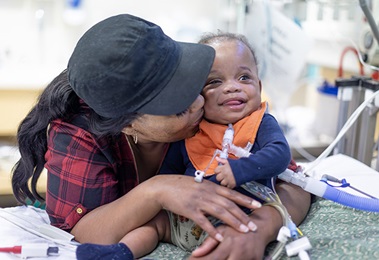Splenectomy
What is a splenectomy?
The procedure to remove the spleen is called splenectomy.
What is the spleen?
The spleen is a soft, dark-purple, organ located in the upper left side of the abdomen, just behind the bottom of the rib cage. It is about the size of a small fist.
What does the spleen do?
The spleen is part of the immune system. It filters foreign substances from the blood, removes worn-out blood cells from the blood, regulates blood flow to the liver, and sometimes stores blood cells. At any given time, almost one-third of the blood in the body is located in the spleen.
Why does the spleen need to be removed?
In children, blood-related diseases are the most common reason for the spleen to be removed. Hemolytic anemia, beta-thalassemia, sickle cell anemia, and idiopathic thrombocytic purpura (ITP) are frequent reasons the spleen may need to be removed.
Occasionally, the spleen must be removed in an emergency surgery after a traumatic injury.
Are there other problems that need to be looked for?
Many children with blood disorders will also develop gallstones. An ultrasound may be ordered to look for gallstones. If present, a surgeon may recommend the gallbladder be removed (this procedure is called a cholecystectomy) at the same time as the spleen.
Can you live without a spleen?
Yes, you can live without your spleen. Once the spleen is removed, however, an individual does have an increased susceptibility to infections.
What needs to happen before a splenectomy?
The child needs to receive certain vaccinations to prevent certain infections. These include vaccinations for Haemophilus influenzae type B, 23-valent Streptococcus pneumoniae and Neisseria meningitidis. The pediatrician or primary care physician is able to administer these vaccines.
What is overwhelming postsplenectomy infection (OPSI)?
OPSI is an infection that may develop rapidly in patients who have had their spleens removed. Under normal conditions these infections may only cause a sore throat. But in patients without their spleen, these infections can be much more serious. In the most severe forms, these infections may result in death. The vaccinations given before surgery help prevent these infections and this scenario is rarely seen.
Splenectomy patients will be instructed on measures to take to help prevent severe infections.
How is the spleen removed?
In many cases, the spleen can be removed using a minimally invasive approach or laparoscopically. This involves up to four small (0.5 cm) incisions in the abdomen to allow a small camera and tiny surgical instruments to pass into the abdomen. If the spleen is very large, one of the incisions may need to be enlarged (2 inches) to be able to remove the spleen.
Laparoscopic splenectomy has shortened the number of days spent in the hospital, the amount of pain after surgery, and allows for a quicker return to full activities.
When the spleen is removed because of a trauma or if it is not possible to perform the surgery laparoscopically, an incision (cut) is made on the abdomen to remove the spleen.
What is the recovery after a splenectomy?
If done laparoscopically, the hospital stay is typically 2-3 days. If the splenectomy is performed “open” the hospital stay may be up to 1 week. Patients receive pain medication both in the hospital and to go home with and will receive instructions from the surgeon about when they may return to school and sporting activities.
Will I need to take medications after a splenectomy?
The benefits of daily antibiotics after a splenectomy are currently up for debate in the medical community. Discuss this with a hematologist to understand options..






